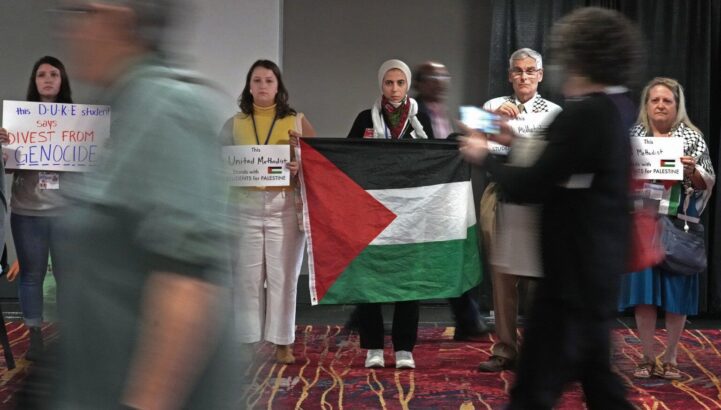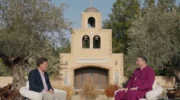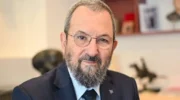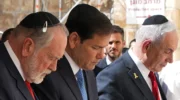In the first such divestment action by a major Christian denomination, the General Conference of The United Methodist Church has voted to divest from Israel bonds, and those of other countries carrying out prolonged military occupations.
by United Methodists for Kairos Response, reposted from Mondoweiss, May 2, 2024
On April 30, 2024, the General Conference of The United Methodist Church, being held in Charlotte, North Carolina, made a groundbreaking call for church investment managers to exclude the bonds of three countries – Israel, Turkey, and Morocco – that are holding subject populations under prolonged military occupation.
In the first such divestment action by a major Christian denomination, the church has called on all its investment managers to avoid “the governmental debt of each such country until the time when each government ends their military occupation.”
The church resolution, “Excluding Government Debt of Countries Involved in Prolonged Occupations,” makes clear the church’s desire to avoid profiting from the suffering and oppression caused by these decades-long occupations: Israel’s occupation of the West Bank including East Jerusalem and the Gaza Strip since 1967, Turkey’s occupation of Northern Cyprus since 1974, and Morocco’s occupation of Western Sahara since 1976.
The UN has identified flagrant human rights violations in all three occupations, including: land confiscation, theft of natural resources, home demolitions and illegal colonization, deprivation of food and water, violence against civilians, mass incarceration for population control, brutality against children, and more.
“The timing of this decision is especially significant. When we see the ongoing genocide happening in Gaza, we do not want to be supporting the Israeli government with unrestricted governmental funds” said Lisa Bender, chair of United Methodists for Kairos Response (UMKR), the group that wrote and organized passage of this divestment legislation.
While much of the church’s legislative session in Charlotte has been focused on church restructuring and issues related to LGBTQ+ rights within the church, deep concern regarding Israel/Palestine also has been a prominent theme of the two-week gathering.
Bishops, delegates, and church members have participated in two public actions over the last week. At the Rally for Palestine on April 25, organized by UMKR, calls were made to “save Gaza” and “stop arming Israel.” A silent vigil on April 30, organized by students from eight United Methodist seminaries, expressed solidarity with Palestinians and also with students advocating on campuses for Palestinian rights. Several statements and prayers by bishops and others in the plenary sessions have spoken of the suffering in Gaza and need for church action.
Besides the resolution on government bonds, the church has adopted this week several other important pieces of legislation related to Israel/Palestine and advocacy for Palestinian rights.
“Addressing Israeli Detention of Children” decries the abuse of Palestinian children at the hands of the Israeli military and seeks to stop U.S. military aid to Israel being used for those human rights violations.
“Protecting the Right to Peacefully Address Injustice” opposes the proliferation of anti-boycott laws in the U.S. and worldwide, which seek to intimidate and penalize those who support economic campaigns related to Israel and its treatment of Palestinians.
The church has renewed its longstanding position on the Israeli occupation in “Opposition to Israeli Settlements in Palestinian Land,” which includes calls for a global boycott of Israeli settlements products and an end to all financial support for the settlements.
Two more resolutions renewed by the church were “United Nations Resolutions on the Israel-Palestine Conflict” and “Holy Land Tours” which sets important guidelines for church members when they visit the region.
Also noteworthy was the defeat of a resolution which would have the church endorse the highly controversial IHRA definition of antisemitism, a document that many human rights defenders have opposed.
“For over a decade, Palestinian Christians have been calling out to the worldwide church for partnership in ending occupation and apartheid. Once again, we United Methodists are responding in a concrete, impactful way even as we continue to pray for peace and justice,” said Bishop Hope Morgan Ward, who also spoke at the Rally for Palestine held in the first week of General Conference.
Colleen Moore, Director of Peace With Justice at The General Board of Church and Society, the social justice agency of the United Methodist Church, stated: “For decades, the United Methodist Church has advocated for an end to occupation for all people in the Middle East. The General Board of Church and Society is pleased that General Conference has renewed longstanding resolutions calling for a just peace in Israel and Palestine, strengthening advocacy and witness for a ceasefire and demilitarization.”
This week’s vote on Israeli and other governments’ bonds is not the first time the United Methodist Church has supported actions that reflect the Palestinian call for BDS (Boycott, Divestment, Sanctions). Besides the longstanding resolution calling for a global boycott of settlements products, the church’s investment agency Wespath has barred investment in five Israeli banks and the Israeli company Shikun & Binui, as well as the international corporation G4S, in relation to the illegal Israeli settlements and other violations of Palestinian human rights.
- United Church of Christ (UCC) labels Israel an Apartheid state
- US Churches & agencies support Palestinian rights, Gaza demonstrators
- Christian leaders, organizations send message to Congress: NO to anti-BDS bill
- Open Letter to the World Council of Churches and the ecumenical movement
- The back story of Passages, Museum of the Bible’s program to take Christian college students to Israel
- No, the Bible doesn’t command Christians to “stand with Israel”
- Christian orgs worldwide denounce Israel’s demonization of Palestinian rights groups





